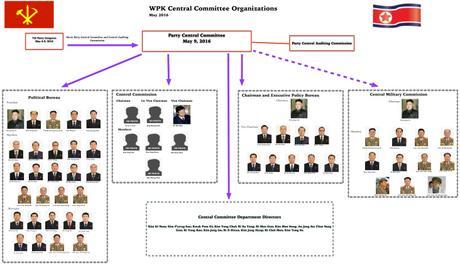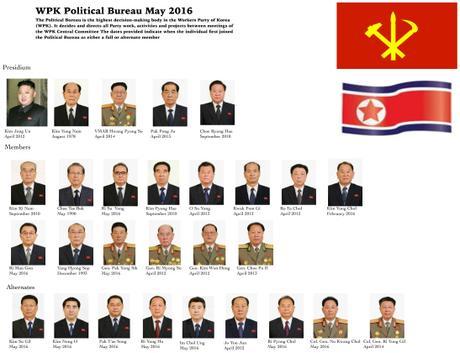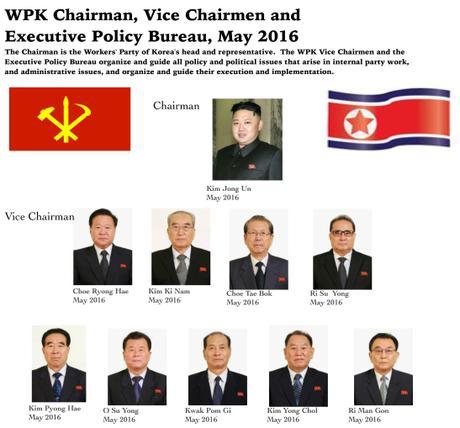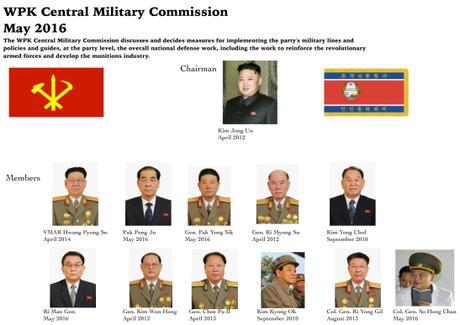
(Photo: NK Leadership Watch Graphic)
The Political Bureau

(Photo: NK Leadership Watch graphic)
There were three distinct changes to the Political Bureau.
First, the number of uniformed officers of the Korean People’s Army [KPA] and the internal security services has been reduced. After the 4th Party Conference in April 2012, the Political Bureau had 11 members and alternates (out of 31), or 35 %, were uniformed officials in the DPRK’s national security community. As of May 10, 2016, the Political Bureau has seven (7) members and alternates (out of 27), or 25% who are uniformed officers. During the first meeting of the 7th Term WPK Central Committee, KPA elders and National Defense Commission Vice Chairman Vice Marshal Ri Yong Mu and General O Kuk Ryol were removed from the Political Bureau, even though they both sat on the Party Congress’ platform. This can all be taken as a superficial sign of the military’s reduced influence in the DPRK’s political culture. That said, three new Political Bureau members and alternates are formerly senior KPA officials, all of whom have migrated from the KPA to the WPK since 2014: former Vice Chief of the KPA General Staff and Reconnaissance General Bureau chief Kim Yong Chol, who became a WPK Secretary (now Vice Chairman) and Department Director in January 2016; former Ministry of the People’s Armed Forces official Kim Su Gil who was appointed Pyongyang’s WPK boss in 2014; and, former commander of the KPA Air and Anti-Air Force Ri Pyong Chol who became a senior deputy WPK Department Director during late 2014.
Second, the Political Bureau, has two highly respected diplomats and foreign policy hands in its membership. DPRK Foreign Minister Ri Su Yong was elected to full Political Bureau membership. The DPRK’s longtime representative to the UN Mission in Geneva and a surrogate father figure and mentor to Kim Jong Un, Ri was also appointed the WPK Vice Chairman for International Affairs replacing another top DPRK diplo Kang Sok Ju, who is terminally ill. It remains to be seen if Ri Su Yong will remain as Foreign Minister or his new WPK Vice Chairman position foreshadows his replacement whenever the Supreme People’s Assembly meets for its annual session. The other diplomat appointed as a Political Bureau alternate member is Ri Yong Ho, currently a Vice Minister of Foreign Affairs, and a long-time delegate member and interlocutor on the DPRK’s WMD programs in both official and Track II discussions. Ri Su Yong and Ri Yong Ho replace the aforementioned Kang Sok Ju and Kim Yang Gon, who died in a car accident in December 2015, as the Political Bureau’s foreign policy representatives. Interestingly, prior to the 3rd Party Conference, in September 2010 the DPRK shuffled around its senior diplomats; at that time Ri Yong Ho was elevated to Vice Minister of Foreign Affairs, Kim Kye Gwan was elevated to his current position as 1st Vice Minister of Foreign Affairs and he replaced Kang Sok Ju who was appointed DPRK Vice Premier.
Finally, with several Political Bureau slots reserved for the KPA and the internal security services having been eliminated freed up some room to appoint alternate members from the WPK’s provincial committees and an additional member of the DPRK Cabinet. So, a superficial reduction of the military’s representation on the Political Bureau in favor of the party and state with the appointment of the WPK’s leading officials from Pyongyang and North and South P’yo’ngan Provinces (Kim Su Gil; Kim Nung O; and, Pak T’ae Song) and a DPRK Cabinet Vice Premier (Im Chol Ung). This is not particularly novel because Political Bureaus historically have included provincial party and Cabinet officials, rather it is part of a general trend from the 7th Party Congress in which the WPK is more functional ruling practices from the past.
WPK Chairman, Vice Chairman and the Executive Policy Bureau

(Photo: NK Leadership Watch graphic)
The most distinct change to the North Korean political system to come out of the 7th Party Congress was the return of the position of Chairman as the WPK’s leading official and representative. Kim Il Sung was the WPK Chairman from 1946 to 1966. The 2nd Party Conference in 1966 eliminated the Chairman position and from then until his demise in 1994 KIS was General-Secretary, a position his son and successor Kim Jong Il was elected to in 1997. In 2012, during the 4th Party Conference the WPK Charter was revised, KJI was declared Eternal General-Secretary and Kim Jong Un became First Secretary.
Along with First Secretary, the 7th Party Congress has revised the WPK Charter and rules, and eliminated the titles of Secretary from the central party (i.e. WPK Central Committee) and replaced it with Vice Chairman (WPK Vice Chairman). This titular change has also been mandated for provincial, city (municipal) county committees and all the way down to basic party organization levels. So now, the leading official will be chairman and his/her deputies vice chairmen/chairwoman.
The 7th Party Congress also eliminated the Secretariat (piso’guk) at both the central party level and in the lower-echelon party organizations. At the lower-echelon party level, the party committees all had a secretariat which has been replaced with an Executive Policy Office which wil be filled by the Chairman and Vice Chairmen (as against the secretariat filled by the chief secretary and secretaries) In the WPK Central Committee, the Secretariat has been replaced with the Executive Policy Bureau. According to the last WPK Charter from 2012, the Secretariat “shall mainly discuss and decide issues that arise in internal party work and other administrative issues, and organize and guide their execution.” The Executive Policy Bureau [EPB] will have a similar mission and function as the former Secretariat, but it is not yet clear if the establishment of the EPB also means enhanced powers in terms of policy formulation, policy execution and personnel affairs.
As with the former Secretariat and WPK Secretaries, all the WPK Vice Chairmen and EPB Members have distinct portfolios and all but two (Choe T’ae Bok and Choe Ryong Hae) are concurrently WPK Central Committee Department Directors.
The Central Military Commission

(Photo: NK Leadership Watch graphic)
Major changes in terms of membership numbers and composition affected the Party Central Military Commission [CMC]. After the 4th Party Conference in April 2012, the CMC consisted of a total of 20 members. After the 7th Party Congress, the CMC has a total of 12 members. The Vice Chairman’s position(s) have been eliminated. Until May 2016, the CMC had traditionally gathered a handful of senior WPK officials in security management and military industries with numerous KPA commanders and senior internal security officials. While the CMC still has a majority of members (7) who are uniformed senior officers of the armed forces and internal security services, the CMC’s membership now only consists of 1st-tier uniformed officers of the senior DPRK national security community making this cohort less diverse than it previously was. The addition of DPRK Premier Pak Pong Ju strongly suggests the consummation of greater party and greater DPRK Cabinet oversight over military affairs, specifically resource allocation in support of weapons research and production. It also remains to be seen if the CMC will continue to hold expanded meetings, or meetings that include KPA commanders and WPK cadres who are not CMC members.
Filed under: 7th Party Congress, Central Committee, Central Military Committee, central party life, Kim Jong-un, KJI Personal Secretariat, Korean People's Army (KPA), Korean Workers' Party (KWP), Political Bureau, Secretariat
